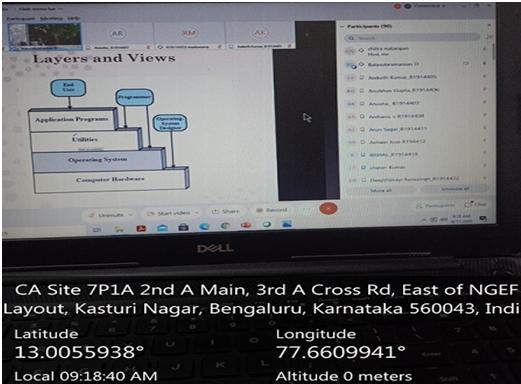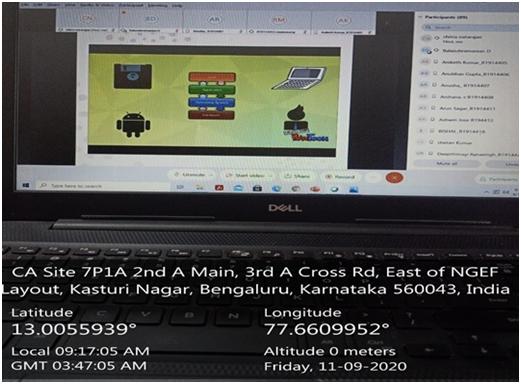NEWS
NEP 2020 Paradigm shift in higher education


Date: 28/8/2020
Day: Friday
Topic: “NEP 2020: PARADIGM
SHIFT IN HIGHER EDUCATION”
The Internal Quality Assurance Cell and The Department of Commerce of New Horizon college, Kasturinagar Bangalore organized a National Level Webinar on 28/08/2020, in association with Centre for Educational and Social Studies (CESS), Bangalore. The event was phased out in two sessions.
The first session was chaired by Dr. Chetan B Singai, Chief Consultant, TS, Committee for Draft NEP & Joint Secretary, Centre for Educational and Social Studies from 10:00 am to 11:00 am on the Sub -Theme : “Transforming Regulatory System of Higher Education.” Dr Chetan enlightened the participants with the regulatory measures that are likely to be brought into the higher education system with the implementation of the new educational policy.
Dr Chetan threw light upon the Central Government’s decision to establish the Higher Education Commission of India (HECI) in the place of UGC which shall be Governing Body for the four independent verticals :
- National Higher Education Council (NHEC)
- National Accreditation Council (NAC)
- Higher Education Grants Council (HEGC) and
- General Education Council (GEC)
He explained the roles and powers of these bodies in the regulating the education system. He also gave insight on National Higher Education Qualification Framework (NHEQF) established by the GEC which shall be in sync with the National Skills Qualification Framework (NSQF) so as to ease the integration of Vocational Education into Higher Education.
He also elucidated the Governance and Leadership of the HEIs through the Board of Governers and the policies of strong self governance and outstanding merit based appointments of institutional leaders.
Dr Chetan highlighted about the autonomous body , The National Research Foundation, (NRF) which will be soon envisaged under the NEP 2020 which will ensure quality research activities by the HEIs.
Thus Dr. Chetan gave a complete picture on the three critical areas of NEP 2020: The HECI, Governance and Leadership and The NRF. His session concluded with a Q&A session and a Vote of Thanks.
The second session was chaired by Dr. Padmavathi B S, Convener, Sub Committee – Task Force on Implementation of NEP in Karnataka (KSHEC, GOK) & Director, CESS from 11:00 am to 12:00 pm on the Sub-Theme: “Towards Holistic and Multidisciplinary Education”. She enlightened the participants with the inclusiveness of all the disciplines in education with the implementation of the NEP 2020.
She gave a comprehensive view of the structure of the Multidisciplinary Undergraduate Degree Programme which will have multiple exit options with appropriate certifications. She also elaborated on the structure of Structure of Multidisciplinary Master Degree and Ph.D. Programme wherein the HEIs will have the flexibility to offer different designs of Master’s programmes. She threw light on the following aspects:
- There may be a 2-year programme with the second year devoted entirely to research for those who have completed the 3-year Bachelor ’s programme;
- For students completing a 4-year Bachelor ’s programme with Research, there could be a 1-year Master’s programme; and
- There may be an integrated 5-year Bachelor’s/Master’s programme.
- Undertaking a Ph.D. shall require either a Master’s degree or a 4-year Bachelor’s degree with Research;
- The M.Phil. programme shall be discontinued.
- An Academic Bank of Credit (ABC) will be established which would digitally store the academic credits earned from various recognized HEIs so that the degrees from an HEI can be awarded taking into account credits earned;
- To enable Holistic and Multidisciplinary education, Multidisciplinary Education and Research Universities-called MERUs- will be set up at par with IITs, IIMs to attain the highest global standards in quality education.
She explained the mechanism of optimal learning environments and support for students offered by the NEP 2020 wherein the following policies and systems will be in place:
- The Institutions and faculty will have the autonomy to innovate on matters of curriculum, pedagogy, and assessment within a broad framework of higher education qualifications;
- All assessment systems will be decided by the HEI, including those that lead to final certification. The Choice Based Credit System (CBCS) will be revised for instilling innovation and flexibility;
- HEIs shall also move away from high-stakes examinations towards more continuous and comprehensive evaluation;
- Each institution will integrate its academic plans ranging from curricular improvement to quality of classroom transaction – into its larger Institutional Development Plan (IDP);
- High-quality support centres and professional academic and career counselling will be made available to all students;
- Norms, standards, and guidelines for systemic development, regulation, and accreditation of ODL will be prepared;
- MHRD will constitute a National Committee for the Integration of Vocational Education (NCIVE), consisting of experts in vocational education and representatives from across Ministries, in collaboration with industry, to oversee this effort;
- Incubation centres will be set up in higher education institutions in partnership with industries;
- Indian standards will be aligned with the International Standard Classification of Occupations maintained by the International Labour Organization;
- The credit-based Framework will also facilitate mobility across ‘general’ and vocational education with great ease to equip youths with skills and knowledge.
The session ended with Q&A and a Vote of Thanks followed by the National Anthem. There were 185 participants from various institutions across the country. E Certificates were issued to the participants and the event turned out to be a great success and fruitful for the participants

